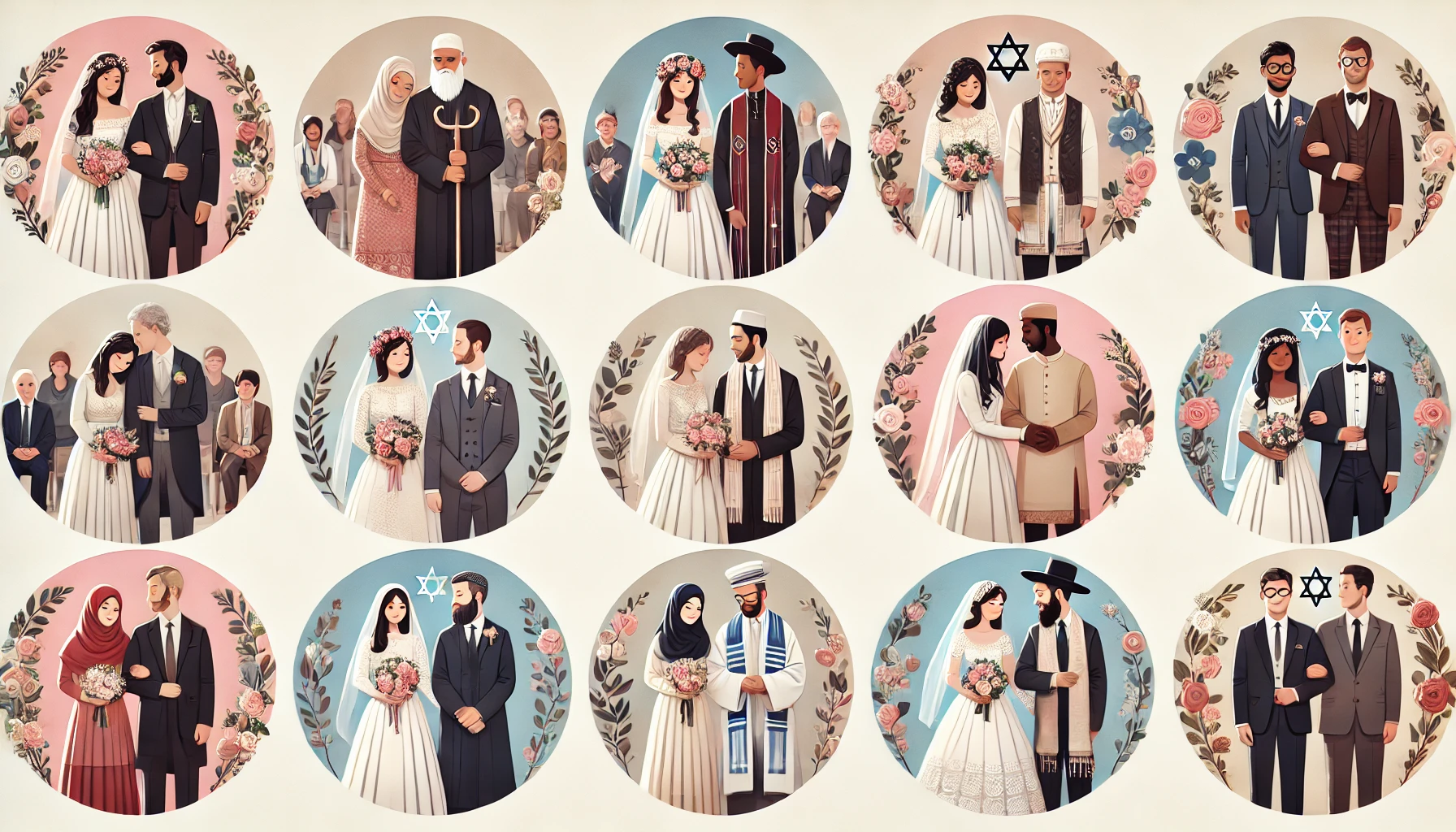
Understanding the Different Types of Marriage
- Share
- Share
- Share
- Share
Marriage is a deeply rooted institution that varies widely across cultures and societies. From traditional to modern, types of marriage reflect the diverse ways people choose to commit to one another. Knowing the various forms can help individuals make informed decisions about relationships that align with their values.
In This Page
- Types of Marriage
- 1. Civil Marriage
- 2. Religious Marriage
- 3. Common-Law Marriage
- 4. Arranged Marriage
- 5. Love Marriage
- 6. Semi-Arranged Marriage
- 7. Court Marriage
- 8. Paper Marriage
- 9. Monogamous Marriage
- 10. Polygyny Marriage
- 11. Interracial Marriage
- 12. Secret Marriage
- 13. Mixed Marriage
- 14. Covenant Marriage
- 15. Parenting Marriage
- FAQs
- Conclusion
Types of Marriage
1. Civil Marriage
A civil marriage is a legally recognized marriage conducted by a government official without any religious affiliations. These ceremonies typically occur at courthouses or municipal halls. Civil marriages are ideal for those who want a straightforward, secular union with full legal benefits.
2. Religious Marriage
Religious marriages occur within a faith-based setting, incorporating rituals, blessings, and community involvement. These marriages are important in many religious communities, as they reflect the couple’s spiritual commitments and shared beliefs.
3. Common-Law Marriage
In common-law marriage, couples are recognized as married without a formal ceremony or license by cohabiting for a certain period. Common in some jurisdictions, this type of marriage is also known as informal marriage, allowing couples legal recognition based on their living arrangement.
4. Arranged Marriage
An arranged marriage involves family members or a third party in the selection of the spouse. Common in Eastern cultures, arranged marriages emphasize compatibility between families and long-term values. Although the couple may have limited interaction before marriage, this type is rooted in tradition and family support.
5. Love Marriage
In a love marriage, the couple chooses each other based on mutual feelings and emotional connection. Love marriages are common in Western cultures, prioritizing personal choice and compatibility over family arrangements.
6. Semi-Arranged Marriage
Semi-arranged marriage combines elements of both arranged and love marriages. Families may introduce potential matches, but the couple has the freedom to interact before committing. This structure offers a balance between family involvement and personal choice.
7. Court Marriage
Also known as civil or registry marriage, court marriage is a straightforward process conducted at a government office without religious rituals. Court marriages are ideal for couples seeking legal recognition without a traditional ceremony.
8. Paper Marriage
A paper marriage is a fraudulent union where the couple marries for legal or financial benefits rather than genuine commitment. Often arranged to gain residency rights, paper marriages are illegal and ethically questionable.
9. Monogamous Marriage
Monogamous marriage involves committing to one spouse at a time, focusing on a lifelong partnership. This traditional form is widely accepted across cultures, emphasizing loyalty and mutual support.
10. Polygyny Marriage
Polygyny is a form of polygamy where a man has multiple wives. Practiced in some societies and permitted in certain religions, polygyny highlights cultural norms and traditional family structures.
11. Interracial Marriage
Interracial marriage unites individuals from different racial or ethnic backgrounds. These marriages promote cultural diversity and inclusivity, although they may still face societal challenges in certain regions.
12. Secret Marriage
A secret marriage is kept private from family, friends, or the public for various reasons, including cultural disapproval or personal preference. This type of marriage reflects unique personal circumstances.
13. Mixed Marriage
Also called interfaith marriage, a mixed marriage involves partners from different religious or ethnic backgrounds. While such unions encourage cultural integration, they may face challenges related to differing beliefs.
14. Covenant Marriage
A covenant marriage includes specific legal or religious restrictions to make divorce more difficult. Recognized in some U.S. states, this marriage type aims to strengthen commitment by encouraging couples to resolve conflicts.
15. Parenting Marriage
Parenting marriage is a modern arrangement where a couple prioritizes co-parenting over romantic involvement. Focusing solely on providing a stable environment for children, this structure emphasizes family support.
FAQs
What are the most common types of marriage?
Civil, religious, arranged, and monogamous marriages are the most common worldwide.
How does common-law marriage differ from civil marriage?
Common-law marriage requires cohabitation without formal ceremony, while civil marriage is registered with legal ceremonies.
Why do people choose arranged marriages?
Arranged marriages often honor cultural values, emphasizing family involvement and long-term compatibility.
Is paper marriage legal?
No, paper marriages are illegal and considered fraudulent as they lack genuine commitment.
What is the purpose of covenant marriage?
Covenant marriage aims to strengthen commitment by making divorce more challenging, encouraging conflict resolution.
Conclusion
Marriage takes many forms, each catering to different values and commitments. Understanding the diverse types of marriage helps people choose paths that align with their beliefs and goals, fostering meaningful relationships.

